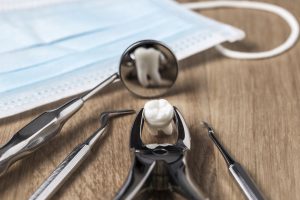No comments yet.
RSS feed for comments on this post.
Sorry, the comment form is closed at this time.
 Your dentist always strives to preserve every natural tooth, but extraction is best in many situations, like severe decay. If your dentist recommends having a tooth removed, it’s normal to have concerns about the road ahead. You don’t have to worry about a painful day in the dentist’s chair, but there are a few things you should know. Here’s what you can expect your tooth extraction to feel like.
Your dentist always strives to preserve every natural tooth, but extraction is best in many situations, like severe decay. If your dentist recommends having a tooth removed, it’s normal to have concerns about the road ahead. You don’t have to worry about a painful day in the dentist’s chair, but there are a few things you should know. Here’s what you can expect your tooth extraction to feel like.
After your initial consultation, your dentist will determine if a simple or surgical extraction is necessary. A simple extraction is used when a tooth is exposed above the gum line. Your dentist will use a local numbing agent to block any pain before your tooth is loosened and removed. Although you may feel some slight pressure, you won’t have any outright pain.
A surgical extraction is needed when a tooth is partially or fully hidden below the gum tissue. Sedation or anesthesia is used, so you won’t feel anything as your dentist extracts the tooth and sutures the tissue closed. The medication will help you relax comfortably in the dentist’s chair with no pain or memory of the procedure.
Although your extraction will be pain free, your mouth will be sore for a few days after the effects of any numbing agents or sedatives dissipate. Your dentist will give you strict aftercare instructions to prevent any healing delays, like a condition called dry socket. It occurs when the blood clot at the extraction site is lost too soon, leaving the underlying nerves and bone exposed.
You can ensure a quick, comfortable recovery by following a few tips recommended by your dentist:
If you have any questions or concerns about what you can expect, don’t hesitate to ask your dentist for clarification.
About Dr. Patricia Wong
Dr. Wong earned her dental degree at the University of Melbourne and has regularly continued her education in various specialties, like general dentistry, orthodontics, and tooth extractions. She uses the most up-to-date services to provide minimally invasive dental solutions. Request an appointment online or call (02) 9158 6761.